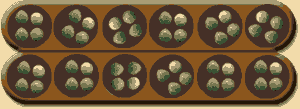|
How the game goes on
Start position
The game starts with the 48 seeds equally distributed in the 12 holes (4 seeds in every hole).
This is the look of the board at the start of the game:

 If you want to see the number of seeds in every hole, you have to activate the corresponding icon.
If you want to see the number of seeds in every hole, you have to activate the corresponding icon.
Moves
Moves are made alternatively by both players. Each move entails in taking all the seeds from one of the holes placed in the own row and sowing all those seeds. The sowing consist in distribute the seeds onto the rest of the holes (own and opponent holes), one by one, counterclockwise, starting from the first hole next to that one where seeds were placed.
If the number of seeds to sow is big enough (12 seeds), it´s possible to make more than one round on the whole board. If so, the starting hole is left empty, the 12th seed is placed in the same hole that first seed is placed, and so on.
Capturing
When the last seed placed during a move is left in an opponent hole, and that hole has two or three seeds (including the sowed seeds), the player who has moved picks up those seeds and keeps them out of the board.
After doing the capture, if the previous hole (previous in the sowing direction) has also two or three seeds and belongs to the opponent, those seeds are also captured; the captures are repeated until previous hole has one or more than three seeds, or belongs to the player who has made the move.
Limitations in the moves and captures
When the holes in the opponent zone are empty, the player who moves must try to sow al least one seed in that zone; if it´s not possible the game finishes, and the player who has the turn captures all the remaining seeds.
When after the sowing the possible captures could cause that the opponent zone left without any seed the move may be made, but no captures will be carried out.
There are many different interpretations about the previous rule, that cause several variants of the game; we opt for this because is also choosen at International unified rules, recognized by the World Oware Federation
Final
The result of the game is decided when some of the players captures up to 25 seeds. Anyway, the more usual is to go on until no more captures are possible.
The program does not finish the game when it detects this situation, but it offers to both players the option to end the game at any moment
When none of the player has got yet 25 seeds and there is no chance to make new captures, both players take out the remaining seeds and the game is over. Each of those seeds is captured by the player who owns the hole where the seed is placed.
The program considers that this situation happens when the same position is repeated during the game
Play now
Play online with some other players
Related links
Copyright © 2001-2026 Ludoteka.com Jokosare S.L. All rights reserved - Disclaimer - Cookies - Contact
